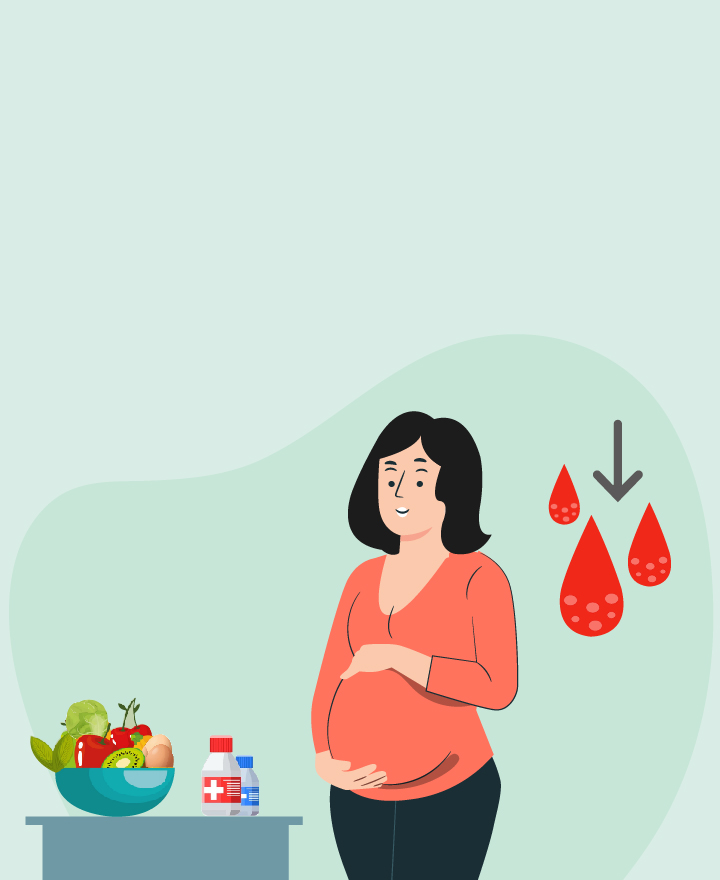

All you need to know about anaemia during pregnancy
Mild anaemia in pregnancy is common. But when it gets severe it can lead to complications like preterm labour. Hence, your doctor may suggest some iron supplements and even tweak your diet. Read on to know more about the symptoms of anaemia in pregnancy and how to deal with them.
What is Anaemia?
This is a blood disorder in which the blood has a reduced ability to carry oxygen due to a lower than normal number of red blood cells, or a reduction in the amount of haemoglobin.
Types of Anaemia During Pregnancy
Anaemia in pregnancy can happen due to three main reasons:
● Deficiency of iron
This is one of the most common causes of anaemia in pregnancy.
● Deficiency of folate
Folate is a type of vitamin that helps keep the iron levels intact in the body. But during pregnancy, many women cannot produce enough folate and this leads to anaemia in pregnancy.
● Deficiency of Vitamin B12
This is another common cause of anaemia in pregnancy and is mostly seen in women who are vegetarian.
Risk Factors for Anaemia in Pregnancy
While most pregnant women are at risk for anaemia, there is a greater risk when:
● Carrying twins or triplets
● Had another pregnancy in the recent past
● Teenage pregnancy
● Low iron diet
● Excessive morning sickness
● An existing patient with anaemia
Symptoms of Anaemia During Pregnancy
Symptoms of anaemia in pregnancy include:
• Pale skin, lips, and nails
• Feeling tired or weak
• Dizziness
• Shortness of breath
• Rapid heartbeat
• Trouble concentrating
If you notice these symptoms, inform your doctor right away.
Risks of Anaemia in Pregnancy
Anaemia in pregnancy should not be ignored. If severe or untreated, then it can increase your risk of having:
● Preterm or low-birth-weight baby
● A baby born with anaemia
● A baby with development delays
● Postpartum depression
Tests for Anaemia
During your first prenatal appointment, you'll get a blood test so your doctor can check whether you have anaemia. Blood tests typically include:
● Haemoglobin test
This test is done to determine the level of iron in your blood.
● Haematocrit test
This test is done to determine the level of red blood cells in your blood.
Even if you don't have anaemia at the beginning of your pregnancy, your doctor will most likely recommend that you get another blood test to check for anaemia in your second or third trimester.
Treatment for Anaemia
If you have anaemia in pregnancy, you may need to start taking an iron supplement and/or folic acid supplement in addition to your prenatal vitamins. Your doctor may also suggest that you add more foods that are high in iron and folic acid to your diet. Here are some healthy foods to include in your meals when you are pregnant:
● Chicken and eggs
● Fish
● Lean red meat
● Dark green, leafy vegetables
● Dairy products like curd and paneer
● Tofu
● Lentils
Preventing Anaemia
While some cases cannot be prevented, you can control the situation by following some precautions:
● Have an iron-rich diet
● Prevent morning sickness by avoiding the common triggers
● Speak to your doctor if you experience blood loss during pregnancy due to an injury
● Have foods and drinks high in vitamin C as that helps in the absorption of iron in the blood
● Avoid bad habits such as smoking and drinking and stay healthy in an overall manner
Conclusion
Anaemia is the deficiency of iron in the blood, and it happens commonly during pregnancy. Fortunately, it can be treated. So, speak to your doctor if you experience any of the above mentioned symptoms and understand on how you can address the issue.
One of the important components of our overall wellness is also being financially secured. Healthcare emergencies can happen any time, but a good health insurance policy can protect you from such uncertain situations. To know more about Wellness and other health related tips, visit the Wellness Corner.
Sources: WebMD.com, Hematology.org
Disclaimer: This blog provides general information and discussions about health and related subjects. The information and other content provided in this blog, website or in any linked materials are not intended and should not be considered, or used as a substitute for, medical advice, diagnosis or treatment. Kindly contact your Doctor before starting a new medicine or health regime.
Related Articles
Blood tests During tests During Pregnancy
Diet tips To follow During Pregnancy
Precautions to Be taken During Pregnancy
Foods to Avoid avoid During Pregnancy
Post delivery Care Tips for New Mother
Published on October 04, 2022





 Health Insurance
Health Insurance  Travel Insurance
Travel Insurance  Car Insurance
Car Insurance  Cyber Insurance
Cyber Insurance  Critical Illness Insurance
Critical Illness Insurance
 Pet Insurance
Pet Insurance
 Bike/Two Wheeler Insurance
Bike/Two Wheeler Insurance  Home Insurance
Home Insurance  Third Party Vehicle Ins.
Third Party Vehicle Ins.  Tractor Insurance
Tractor Insurance  Goods Carrying Vehicle Ins.
Goods Carrying Vehicle Ins.  Passenger Carrying Vehicle Ins.
Passenger Carrying Vehicle Ins.  Compulsory Personal Accident Insurance
Compulsory Personal Accident Insurance  Travel Insurance
Travel Insurance  Rural
Rural